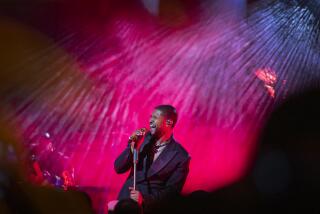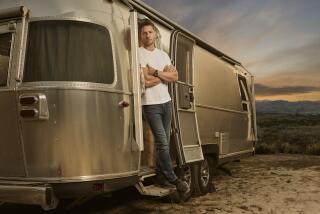Living for the Next Gig
The lead singer-songwriter lay in the back, woozy, something wrong in his brain, as the van headed back to L.A. from Colorado. None of the other three guys in the band said anything.
All they could think about was all the dominos that had, until the day before, lined up so perfectly: They’d gotten the major record-label deal every young band craved. Their debut CD was in the stores. They’d been heading toward a Midwest tour that would set the stage for radio play and a national reputation.
And now their frontman was looking death in the face and it was all slipping through their fingers. They felt horrible -- selfish -- for thinking about that and worse when they thought about what their buddy must be confronting.
The band called itself Pseudopod. It was made up of four ex-UCLA students recently out of school, two with degrees in music, playing classic rock with funk and jazz undertones. It had built a small but fervent fan base that exchanged videotapes of the group’s live shows, planned road trips to out-of-town gigs and reveled in the band’s extended jams.
It was mid-November of last year when all that came apart.
The singer, Kevin Carlberg, 25, a charismatic performer, started throwing up after a Denver meeting with organizers of a get-out-the-youth-vote group. Pseudopod was supposed to drive to Fort Collins for a show that night, but Kevin, whose nausea was accompanied by a stabbing headache, wound up in an urgent-care facility, then in an emergency room. His bandmates started calling the managers in L.A. Speculation ran to food poisoning or an infection.
Kevin called his fiancee, Meritt Elliott, who was designing her bridesmaids’ dresses. They’d been together as long as the band, four years. Kevin had proposed last Christmas. The wedding was 10 weeks away.
Meritt, who suffers from a prolonged immune-system disorder, suspected the worst. The couple began the stunned, bad-dream dialogue that so often accompanies sudden tragedy. We’re 25, she thought. We’re supposed to be deciding what suits and dresses we’re wearing. She drove from West Hollywood to Kevin’s mother’s house in the West San Fernando Valley to tackle more immediate questions, like whether Kevin’s musicians-union insurance had lapsed.
Back in Colorado, one ER doctor told Kevin, who listened through a haze of painkillers, that there was something in his brain the size of a fist. Later, a specialist reviewed a brain scan and reduced the dimension to a small walnut. We can operate here or you can go back to L.A., they told him, but you need to move quickly. Flying might pose a risk, so the band drove west.
They were tightly bound. Two of them, guitarist Ross Grant and drummer Tim McGregor, both 24, had played together since middle school in a Bay Area suburb. They both wound up in UCLA’s music department after Ross spent a year at a music conservatory. Early on, they bumped into an ethnomusicology major and bassist named Brian Fox, who was two years older, and formed a funk cover band.
One night late in 1998, Ross and Tim stopped by a Westwood bar where Kevin had become a popular solo performer. He was self-taught. He’d been a Catholic high school jock in the San Gabriel Valley community of La Verne when somebody put a guitar in his hands his senior year. He learned a chord, then another, then started writing songs, then started haunting open-mike nights. As Ross watched Kevin that first time, he felt the crowd of 50 could not take its eyes off the singer. Ross and Tim told Kevin they liked his songs, and as they began practicing in the basement of a fraternity house, Kevin liked the way the more sophisticated musicians rearranged his tunes.
They called themselves “pod,” then realized they’d face problems from the established band P.O.D. Ross, who was premed, stumbled onto “pseudopod” in a textbook. He didn’t know the definition (an organism’s temporary foot). It didn’t matter.
They joined the roster of hundreds of local bands that were able to book club dates only by pre-selling tickets. Gradually they became something of a UCLA house band, regularly playing a club in Santa Monica on weeknights, trying to play out-of-town gigs on the weekends. In 2000, they entered an Internet contest for college bands from across the country and won, earning $25,000. They used the money to put out a CD the next year, which helped them find management and attracted an offer from an Interscope Records executive, who watched a packed Santa Monica show where he was impressed by the way the fans sang along. Ross was able to delightedly tell his father, a physician: Dad! I don’t have to get a real job.
Last year, Interscope sent the band to Memphis for three months to record its first label release. Playing festivals during the summer, Pseudopod met a constantly touring band named O.A.R., which asked it to open some dates in the fall. That was where they were ultimately headed -- to Lincoln, Neb. -- when Kevin got sick in Colorado.
The five-hour surgery was done at UCLA Medical Center. The questions were: Was the mass a tumor, and was the tumor malignant? The answers were: yes and yes.
Even before the operation, Ross had updated the band’s Web site with a report on Kevin. Between Kevin’s large family, friends and fans, his hospital room seemed never to have fewer than 20 people. Kevin went home in a day and a half and began seven weeks of radiation. The rest of the band remained numb. People can return to desk jobs in a couple of weeks after brain surgery, but rock ‘n’ roll? They told themselves to take it one day at a time. Kevin already knew that drill. Four years before, his father had died of a heart attack at 50 and the family motto became carpe diem. Now he again had to stay true to that path and not spend his life worrying about each forthcoming MRI, each test of whether the cancer had returned to his body.
On Kevin’s second day home, Ross called, curious about any neurological effects.
Have you tried to play yet? he asked.
Sure, Kevin lied. But he was spooked. As soon as he hung up the phone, he asked Meritt for his guitar, fingered it and strummed a chord.
He was still Kevin.
Meritt took him to radiation five mornings a week at 6:45. He’d faithfully given her a massage every night of their relationship for her own ailment. I’ll be his rock, she told herself, because he’s been mine. Chemotherapy pills five days a month followed. Kevin lost his hair and started wearing a wool cap. He had occasional nausea, dryness and dental problems. In his first month home, he spent considerable time trying to resolve his finances, applying for government assistance to cover what his insurance didn’t. Interscope agreed to underwrite some of his and the other band members’ living expenses temporarily. He and Meritt kept their January wedding date, but scaled back the guest list from 200 people to a small family gathering.
Kevin started taking walks. Three weeks after the surgery, he started jogging again. He read Lance Armstrong’s autobiography. He waited for his body to tell him he could play again. His neurologist thought he was one of the most positive patients she’d seen. She told him it was hard to make a prognosis this early, but that his age and physical condition worked in his favor, and that he could resume his career in early January. Around that time, he began writing in his journal, and songs began coming again, including one that wondered:
Is it luck or is it chance
is it all circumstance
that I’m winning this strange lottery?
In mid-January, some of the things that had fallen apart started to come back together.
The band began practicing again. There were grins, chills and small trepidations. Kevin felt everyone’s eyes were on him. From behind his drums, Tim wondered: If he makes a mistake, is it Kevin or is it something he can’t control?
O.A.R., the perpetual touring band, was still willing to invite Pseudopod on the road. Interscope added some other dates to create a tour of 25 cities in 12 states, mostly in the Midwest, in 34 days to begin in March. The band’s managers, Inga Vainshtein Smith and Mark Smith, arranged for Kevin to appear at a handful of children’s hospitals. The push for radio play, originally scheduled for January, was pushed back to April.
Later in January, they played a warmup gig in Davis, Calif. Now music felt like a privilege, Kevin said. In early February, he had another MRI: No new tumor growth. They’d test again in April.
In mid-February, Kevin and Ross flew back to Memphis to record eight new songs for a CD the band will sell over the Internet to finance Kevin’s medical costs not covered by insurance.
Two days before the band hit the road, driving its own van and pulling a trailer full of equipment, Kevin took his acoustic guitar to a career day at the Catholic school in Glendora his sisters once attended. He never mentioned his illness, just the joy of playing, how good it made him feel, right down to that first time he learned the elemental G chord.
The next night the band headlined the Whisky in West Hollywood. A few hundred hard-core fans exploded in applause when they took the stage around 11 p.m. Kevin was less manic on stage than usual, sipping water continually and cutting the set down to 90 minutes, but he bounced vigorously through every song, and the mood in the room was triumphant.
“I don’t know how many of you guys know what’s been going on,” Ross told the crowd after the second song, “but it’s amazing to have this guy back with us.” Later, between songs, Kevin shouted, “I love you guys!”
What was different? “What you complain about,” Tim said. “You play a show in Kansas and nobody shows up; now it’s, ‘Can we play Kansas? And I don’t care if anybody’s there.’ ”
“We used to sit and say, ‘One day he’ll sell out stadiums,’ ” Meritt said, “and one day we’ll have a vacation in Europe. And all of that is gone. It’s all about enjoying the smell of the air or enjoying a great piece of pizza.”
“You don’t take as much for granted,” Kevin said. “It’s one day at a time, and today is cool.”
Thursday, after gigs in Tucson, Colorado Springs and Vail, Pseudopod drove into Fort Collins to finally play the show that never happened.
“I kinda look at it as a blessing,” Kevin said as the van neared the city. “It’s where they found [the tumor]. If they hadn’t found it there, it could have gotten much worse.
“It’ll be fun to say I conquered Fort Collins again.”
More to Read
The biggest entertainment stories
Get our big stories about Hollywood, film, television, music, arts, culture and more right in your inbox as soon as they publish.
You may occasionally receive promotional content from the Los Angeles Times.










